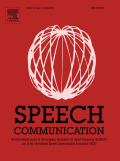
SPEECH COMMUNICATION
Scope & Guideline
Unlocking Insights into Speech and Linguistic Processes.
Introduction
Aims and Scopes
- Speech Recognition and Processing:
Research focusing on algorithms and techniques for automatic speech recognition (ASR), including advancements in neural network architectures and machine learning models. - Speech Synthesis:
Studies related to generating human-like speech from text, encompassing various methodologies including deep learning, concatenative synthesis, and waveform generation. - Speech Quality Assessment:
Investigations into metrics and models for evaluating speech quality, including non-intrusive methods and the impact of various noise conditions on intelligibility. - Emotion and Speaker Recognition:
Exploration of emotional cues in speech, techniques for emotion recognition, and methods for identifying speakers based on vocal characteristics. - Multimodal Speech Processing:
Research integrating audio with visual or textual information to enhance speech understanding and recognition, particularly in challenging environments. - Speech Disorders and Rehabilitation:
Studies aimed at understanding and improving speech production and recognition for individuals with speech disorders, including dysarthria and other conditions. - Cross-linguistic and Dialectal Studies:
Examination of speech characteristics across different languages and dialects, focusing on phonetic, phonological, and prosodic features. - Applications of Speech Technology:
Practical applications of speech technologies in various fields such as healthcare, education, and human-computer interaction, aiming to solve real-world problems.
Trending and Emerging
- Self-supervised Learning in Speech Processing:
There is a growing trend towards self-supervised learning techniques that require less labeled data while still achieving high performance in tasks like speech recognition and emotion detection. - Integration of AI and Speech Technologies:
The intersection of artificial intelligence with speech technology is becoming increasingly prominent, with research exploring AI-driven enhancements in speech recognition and synthesis. - Speech Emotion Recognition and Affective Computing:
A surge in interest around recognizing emotions from speech signals, with applications in healthcare, customer service, and human-computer interaction. - Multimodal Interaction Systems:
Emerging research is focusing on systems that combine audio with visual or haptic feedback to improve communication effectiveness in various settings. - Voice Conversion and Style Transfer:
Research into voice conversion techniques and the ability to transfer vocal styles has gained traction, particularly in creative applications and entertainment. - Neural Network Architectures for Speech Applications:
The development and comparison of novel neural network architectures specifically tailored for speech applications is increasingly prevalent, showcasing advancements in deep learning. - Robustness in Speech Recognition:
Research aimed at improving the robustness of speech recognition systems in noisy or variable environments is becoming a key focus, addressing real-world challenges.
Declining or Waning
- Traditional Acoustic Modeling Techniques:
Research focused on classical statistical modeling approaches for speech recognition has decreased as deep learning techniques have become dominant. - Low-level Signal Processing:
Studies that primarily concentrate on low-level signal processing methods, such as basic filtering and spectral analysis, appear to be waning in favor of more integrated and high-level approaches. - Basic Phonetics and Phonology:
While foundational phonetic and phonological studies remain important, there seems to be a shift towards applied and computational aspects, leading to fewer publications in purely theoretical phonetics. - Static Analysis of Speech Features:
Research that relies heavily on static feature extraction without considering dynamic or contextual factors is becoming less prevalent, as the focus shifts to more adaptive and context-aware approaches.
Similar Journals

JASA Express Letters
Accelerating knowledge exchange in acoustics and beyond.JASA Express Letters is a distinguished open-access journal published by AIP Publishing, dedicated to fostering rapid dissemination of high-quality research in the field of acoustics and related areas of music and arts. With an E-ISSN of 2691-1191, this journal strives to provide a platform for innovative and impactful studies, showcasing research that bridges disciplines and advances our understanding of acoustic phenomena. Since transitioning to open access in 2021, the journal has gained a reputation for swift publication, accommodating the needs of researchers eager to share their findings with a global audience. Notably, JASA Express Letters ranks in the top quartile for music and arts-related disciplines, standing at Rank #25/180 and Rank #174/552 respectively, reflecting its significance and influence within the academic community. This journal serves not only as a valuable resource for scholars and practitioners but also aims to inspire new directions in both theoretical and applied research, enhancing collaborative efforts in the vibrant fields of acoustics and the arts.
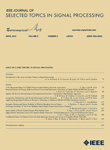
IEEE Journal of Selected Topics in Signal Processing
Transforming Ideas into Impactful Signal Processing SolutionsIEEE Journal of Selected Topics in Signal Processing is a premier academic publication dedicated to the advancement of knowledge in the field of signal processing. Published by IEEE-INST ELECTRICAL ELECTRONICS ENGINEERS INC, the journal boasts an impressive impact factor that places it in the top tier of its category; ranked Q1 in both Electrical and Electronic Engineering and Signal Processing for 2023. Given its esteemed standing, the journal serves as a vital resource for researchers, professionals, and students alike, providing cutting-edge insights and developments that shape the future of signal processing. The journal encompasses a wide array of topics relevant to the evolving landscapes of electrical engineering and computer science, with particular significance in innovative applications and methodologies. As a platform for disseminating high-quality research, this journal remains essential for those seeking to stay at the forefront of this dynamic field. You can explore the latest contributions and findings, benefiting from the journal's influential status in the realm of signal processing.

Jordan Journal of Electrical Engineering
Exploring the Frontiers of Energy SystemsJordan Journal of Electrical Engineering, published by TAFILA TECHNICAL UNIVERSITY (TTU) in Jordan, serves as a critical platform for disseminating groundbreaking research in the fields of electrical engineering, energy systems, and related disciplines. With an ISSN of 2409-9600 and an E-ISSN of 2409-9619, the journal is committed to promoting advancements in energy engineering, biomedical applications, control systems, and signal processing among others. Despite its recent establishment in 2023, it has been indexed in multiple categories within Scopus, receiving rankings that reflect its emerging role in the academic community. Researchers and professionals are encouraged to contribute and access cutting-edge articles through open access options, ensuring that knowledge is readily available to all interested parties. As the journal continues to grow, it aims to bridge gaps in knowledge and stimulate dialogue, thereby supporting innovation and practical applications in the engineering sector.
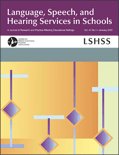
LANGUAGE SPEECH AND HEARING SERVICES IN SCHOOLS
Connecting research and practice for impactful educational outcomes.LANGUAGE SPEECH AND HEARING SERVICES IN SCHOOLS is a leading academic journal published by the American Speech-Language-Hearing Association, dedicated to advancing the fields of linguistics, speech, and hearing within the educational setting. With an ISSN of 0161-1461 and an E-ISSN of 1558-9129, this journal plays a pivotal role in disseminating peer-reviewed research that addresses critical issues faced by speech-language pathologists, educators, and researchers in schools. It has earned a distinguished reputation, ranking in the Q1 category for both Linguistics and Speech and Hearing in 2023, attesting to its impact and relevance in these fields. The journal seeks to publish original research, reviews, and evidence-based practices that improve speech and language services in educational contexts. Although it is not an open-access journal, it remains vital for professionals aiming to enhance communication disorders management in school environments. By bridging theoretical research and practical application, LANGUAGE SPEECH AND HEARING SERVICES IN SCHOOLS serves as an indispensable resource for advancing the scientific understanding of speech and language processing in educational settings.

Auditory and Vestibular Research
Fostering Dialogue in Hearing and Vestibular ResearchAuditory and Vestibular Research is an esteemed open-access journal published by Tehran University of Medical Sciences, dedicated to advancing the field of otorhinolaryngology and speech and hearing sciences. Established to foster scholarly communication, this journal has gained traction since its inception and has been openly accessible since 2015, encouraging a wider dissemination of research findings. With an E-ISSN of 2423-480X, it features a diverse range of studies and reviews that reflect the latest advancements and methodologies in auditory and vestibular functioning. As of 2023, the journal is ranked Q3 in both Otorhinolaryngology and Speech and Hearing categories, indicating a growing significance within the academic landscape, especially among researchers and healthcare professionals focusing on auditory health. By publishing quality research and facilitating dialogue within the community, Auditory and Vestibular Research plays a crucial role in informing practice and enhancing knowledge in these vital areas of medicine.
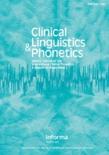
CLINICAL LINGUISTICS & PHONETICS
Pioneering Studies for Better Communication OutcomesClinical Linguistics & Phonetics, published by Taylor & Francis Inc, is a leading peer-reviewed journal that occupies a pivotal role in advancing the fields of linguistics and speech-language pathology. With its ISSN 0269-9206 and E-ISSN 1464-5076, this journal has been instrumental since its inception in 1987, providing an esteemed platform for research that addresses the intersection of language and health. Holding a prestigious Q1 ranking in Linguistics and Language and a solid Q2 rank in Speech and Hearing as of 2023, it is well-regarded for its rigorous standards and impactful research contributions. The journal does not currently offer open access options, yet it remains accessible to a broad academic audience that values quality scholarship. By disseminating vital empirical studies and theoretical advancements, Clinical Linguistics & Phonetics not only enriches the academic discourse but also supports professionals seeking to enhance their practice based on the latest evidence in communication disorders and phonetic research.
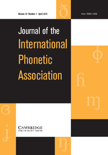
Journal of the International Phonetic Association
Connecting Scholars Through Phonetic InquiryThe Journal of the International Phonetic Association, published by Cambridge University Press, is a premier academic journal that has played a pivotal role in the fields of Anthropology, Linguistics and Language, and Speech and Hearing since its inception in 1971. With an impressive Q1 ranking in both Anthropology and Linguistics and Language, and a Q2 ranking in Speech and Hearing, this journal serves as a vital platform for researchers, professionals, and students engaged in the study of phonetics, speech patterns, and linguistic diversity. The journal provides unparalleled access to high-quality, peer-reviewed research, fostering scholarly dialogue and advancements in the understanding of sound systems across languages. With a broad scope that spans from historical studies to contemporary methodologies, it remains instrumental in shaping academic discourse in its fields. Although the journal does not offer Open Access options, its rigorous editorial standards and reputable publisher ensure that the research published within its pages meets the highest scientific benchmarks. As a crucial resource for anyone invested in the complexities of human language and communication, the Journal of the International Phonetic Association continues to illuminate the interplay between sounds and meanings in our global society.
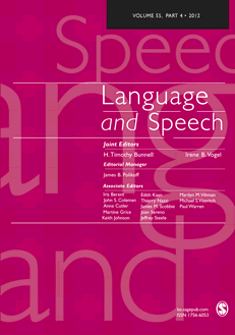
LANGUAGE AND SPEECH
Fostering Innovation in Linguistic and Sociological StudiesLANGUAGE AND SPEECH, published by SAGE PUBLICATIONS LTD, is a premier journal that serves the multifaceted realms of linguistics, speech science, and sociology. With a robust history of scholarly contribution since 1958 and an anticipated continuation through to 2024, the journal is recognized for its high-impact research, boasting a commendable impact factor and achieving Q1 ranking in both Linguistics and Sociology as well as Q2 in Medicine and Speech and Hearing categories as of 2023. The journal, available in both print and online formats with ISSN 0023-8309 and E-ISSN 1756-6053, provides a vital platform for interdisciplinary discourse among researchers, professionals, and students alike. Its rigorous review process and quality publications place it at the forefront of academic inquiry, offering critical insights that advance the understanding of language and its implications in various contexts. As a key resource in the field, LANGUAGE AND SPEECH continues to foster innovation and knowledge dissemination, making it an essential addition to the libraries of those committed to exploring the depths of communication sciences.
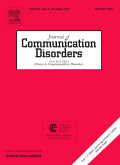
JOURNAL OF COMMUNICATION DISORDERS
Bridging Research and Practice in Communication Disorders.Journal of Communication Disorders (ISSN: 0021-9924; E-ISSN: 1873-7994) is a leading publication in the field of communication disorders, published by Elsevier Science Inc. With a converged publishing timeline from 1967 to 2024, this journal has established itself as a vital resource for researchers, clinicians, and educators dedicated to advancing knowledge in areas such as linguistics, language processing, speech, and hearing. It boasts an impressive reputation, ranking in the Q1 category for Linguistics and Language, and Q1 in LPN and LVN as well as Q2 in Speech and Hearing for 2023, highlighting its influence and scholarly impact within these domains. The journal is recognized for its rigorous peer-reviewed articles and its contributions to our understanding of cognitive neuroscience, experimental psychology, and communication disorders—further evidenced by its ranking in the top percentiles in various fields. Although it does not currently offer Open Access options, readers and contributors alike will appreciate the depth and breadth of research published within its pages. This journal serves an essential role in bridging the gap between research and practical application, making it a must-read for anyone involved in the study or treatment of communication disorders.

EURASIP Journal on Audio Speech and Music Processing
Bridging science and sound through rigorous research.EURASIP Journal on Audio Speech and Music Processing is a distinguished open-access journal published by Springer, focusing on the rapidly evolving fields of audio, speech, and music processing. Established in 2006, this journal has become a pivotal platform for researchers, professionals, and students interested in advancing the state-of-the-art technologies and methodologies in acoustics and electronic engineering. With an impressive impact factor and ranking—Q2 in both Acoustics and Ultrasonics and Electrical and Electronic Engineering—this journal serves as a vital resource, disseminating innovative research findings that contribute to the academic and practical realms of audio processing. The rigorous peer-review process ensures that only high-quality manuscripts are published, reinforcing the journal's credibility and importance in the field. The journal is indexed in prominent databases, making it accessible to a global audience keen on exploring the latest developments from 2007 to 2024 and beyond. For researchers looking to share their work or stay abreast of the latest advancements, EURASIP Journal on Audio Speech and Music Processing is an essential resource that champions the interplay of science and technology in audio processing.